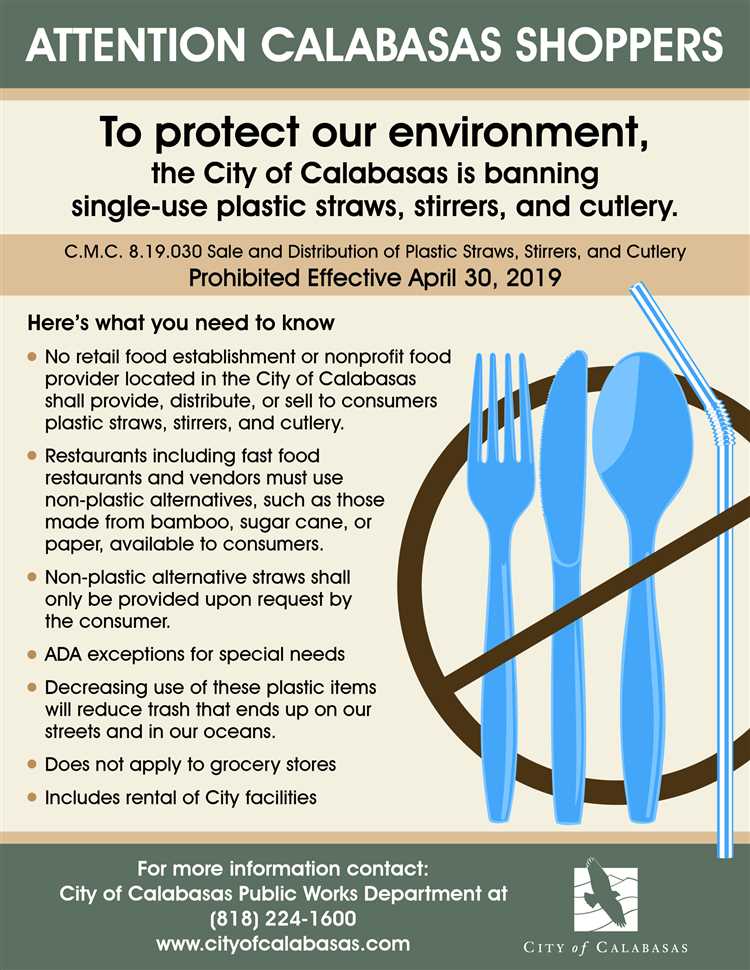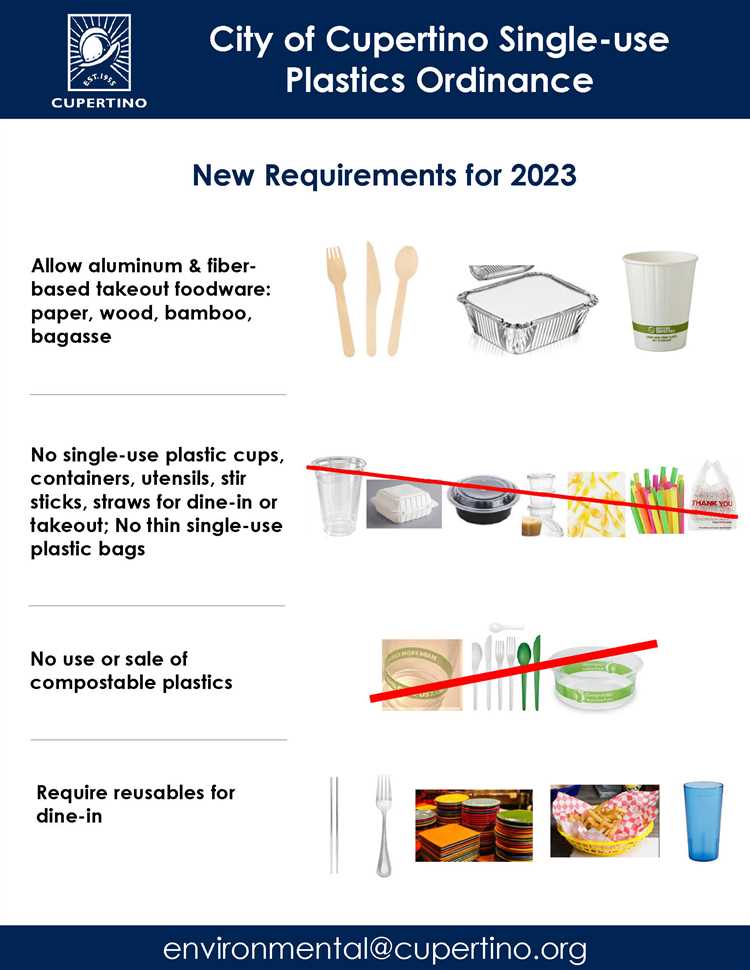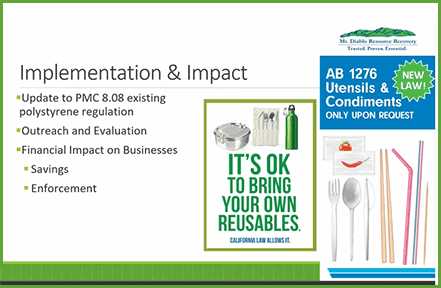
In an effort to reduce plastic waste and promote sustainability, California recently implemented a new law targeting plastic utensils. This law aims to phase out the use of single-use plastic utensils in restaurants, fast food chains, and other food establishments throughout the state.
What does this mean for businesses and consumers?
For businesses, the law requires that they only provide plastic utensils upon request. This means that restaurants and other food establishments must actively ask customers if they need utensils before automatically including them with every order. By doing so, businesses can help reduce the amount of plastic waste generated and encourage customers to opt for more environmentally friendly alternatives, such as reusable utensils.
Failure to comply with this law may result in fines or penalties for businesses.
For consumers, this law serves as a reminder to be more conscious of our plastic consumption. It encourages us to reconsider our reliance on single-use plastics and explore alternative options. By choosing to dine in or bring our own utensils when ordering takeout, we can contribute to the reduction of plastic waste and promote a more sustainable future for California.
- Overview of California’s Plastic Utensil Law
- Key Points:
- Implications and Benefits:
- Understanding the California Plastic Utensil Law
- Key Elements of the Law
- Benefits of the Law
- Why the California Plastic Utensil Law Was Implemented
- Benefits of the Law:
- Impacts of the California Plastic Utensil Law
- Compliance and Enforcement of the California Plastic Utensil Law
- Benefits of the California Plastic Utensil Law
- 1. Reduction in Plastic Waste
- 2. Conservation of Natural Resources
- 3. Health Benefits
- 4. Economic Opportunities
- Future Outlook for Plastic Utensils in California
- 1. Increased Demand for Reusable Utensils:
- 2. Innovation in Compostable Utensils:
- 3. Government Regulations and Policies:
- Q&A:
- What is the California Plastic Utensil Law?
- When does the California Plastic Utensil Law go into effect?
- Are there any exceptions to the California Plastic Utensil Law?
- Why was the California Plastic Utensil Law implemented?
Overview of California’s Plastic Utensil Law
The California Plastic Utensil Law, also known as Assembly Bill (AB) 1884, is a state law that aims to reduce plastic waste by restricting the automatic distribution of single-use plastic utensils in food service establishments.
Key Points:
- The plastic utensil law prohibits food service establishments, such as restaurants and take-out joints, from providing plastic utensils to customers unless specifically requested.
- Customers can still choose to use plastic utensils if they prefer, but they will need to ask for them rather than receiving them automatically.
- The law covers various types of single-use plastic utensils, such as forks, spoons, knives, and chopsticks, that are typically provided with take-out or delivery orders.
- This law does not apply to reusable, compostable, or biodegradable utensils. Food service establishments still have the option to provide these environmentally friendly alternatives.
- The aim of the law is to encourage individuals to think twice before using single-use plastics, reducing overall plastic waste and promoting more sustainable practices.
The California Plastic Utensil Law went into effect on January 1, 2022, and is part of the state’s broader efforts to address plastic pollution and promote a more circular economy.
Implications and Benefits:
This law has several implications and potential benefits:
- Reduction of plastic waste: By limiting the distribution of single-use plastic utensils, the law aims to reduce the amount of plastic waste that ends up in landfills and the environment.
- Encouraging sustainable behavior: By requiring customers to request plastic utensils, the law promotes conscious decision-making and encourages individuals to consider alternatives, such as reusable utensils.
- Promoting the use of eco-friendly alternatives: While plastic utensils are restricted, establishments can still provide reusable, compostable, or biodegradable utensils, which can help reduce the overall environmental impact of food service operations.
- Creating a cleaner and healthier environment: By reducing plastic waste, this law aims to contribute to a cleaner and healthier environment for California residents and wildlife.
Overall, the California Plastic Utensil Law serves as a proactive step towards a more sustainable future, encouraging individuals and businesses to adopt eco-friendly practices and reduce plastic waste.
Understanding the California Plastic Utensil Law
The California Plastic Utensil Law is a regulation implemented by the state to reduce plastic waste and encourage the use of more sustainable alternatives. This law specifically targets single-use plastic utensils, such as forks, spoons, and knives, that are commonly used in restaurants, fast-food chains, and other dining establishments.
Key Elements of the Law

The law requires food facilities to only provide plastic utensils upon customer request, rather than automatically including them with each order. This is aimed at reducing the unnecessary distribution of plastic utensils, as many customers often do not require them.
Additionally, the law encourages food establishments to offer alternative options to plastic utensils, such as reusable utensils made from materials like metal or bamboo. By providing these alternatives, businesses can play a role in reducing the demand for plastic utensils and promoting more sustainable practices.
Benefits of the Law
The implementation of the California Plastic Utensil Law brings several benefits to both the environment and the community. Firstly, it helps to decrease the amount of plastic waste generated, as single-use plastic utensils are a significant contributor to the global plastic pollution problem.
Furthermore, the law promotes awareness and educates consumers about their impact on the environment. By making customers actively request plastic utensils, it encourages them to consider whether they really need them and explore alternative options. This increased consciousness can lead to more sustainable habits and a reduced reliance on single-use plastics.
Lastly, the law creates opportunities for businesses to innovate and adapt to more sustainable practices. By offering alternative utensil options and embracing eco-friendly initiatives, restaurants and food establishments can showcase their commitment to the environment, attracting environmentally conscious customers and improving their reputation.
In conclusion, the California Plastic Utensil Law serves as a crucial step towards reducing plastic waste and promoting sustainability in the food industry. By educating consumers, encouraging alternative options, and fostering innovation, this law plays a significant role in protecting our planet for future generations.
Why the California Plastic Utensil Law Was Implemented
The California plastic utensil law was implemented in order to address the increasing environmental concerns surrounding single-use plastic utensils. These utensils, such as forks, spoons, and knives, are frequently used for take-out and delivery meals, contributing to a significant amount of plastic waste.
Environmental Concerns:
Single-use plastic utensils are not easily biodegradable and can take hundreds of years to decompose in the environment. This leads to a buildup of plastic waste in landfills, rivers, and oceans, causing harm to wildlife and ecosystems. The implementation of this law aims to reduce the environmental impact of plastic utensils by encouraging the use of more sustainable alternatives.
Promoting Sustainable Practices:
The plastic utensil law also aims to promote sustainable practices by encouraging restaurants and food establishments to provide utensils only upon request. This helps to reduce the unnecessary distribution of utensils and encourages individuals to use utensils they may already have or prefer to use from home. By doing so, the law aims to minimize the production and consumption of single-use plastic utensils.
Benefits of the Law:
The implementation of the California plastic utensil law has several benefits, including:
1. Reduction of Plastic Waste: By minimizing the usage of single-use plastic utensils, the law helps to reduce the amount of plastic waste that ends up in landfills and natural environments.
2. Protection of Wildlife: Plastic utensils can harm wildlife, both on land and in the water. By reducing their usage, the law helps to protect animals and ecosystems from the negative consequences of plastic pollution.
3. Encouragement of Sustainable Alternatives: The law encourages the use of more sustainable alternatives to plastic utensils, such as those made from biodegradable materials or reusable options like metal or bamboo utensils. This promotes the development and usage of eco-friendly products.
The implementation of the California plastic utensil law is part of a wider effort to reduce plastic waste and promote sustainable practices. By addressing the issue at its source, the law aims to create a cleaner environment for current and future generations.
Impacts of the California Plastic Utensil Law
Reduced plastic waste: The implementation of the California Plastic Utensil Law has led to a significant reduction in plastic waste. By prohibiting the distribution of single-use plastic utensils, restaurants and food establishments are now encouraged to seek alternative options, such as compostable or reusable utensils. This shift towards more sustainable choices has resulted in less plastic ending up in landfills and polluting the environment.
Promotion of sustainability: The law serves as a catalyst for promoting sustainability in the food service industry. It encourages businesses to prioritize environmentally friendly practices and invest in eco-friendly alternatives to plastic utensils. This has led to an increased awareness and appreciation for the importance of reducing plastic waste, not only in California but also in other states and regions.
Behavioral change: The California Plastic Utensil Law has fostered a positive behavioral change among consumers and businesses. With plastic utensils no longer readily available, people have had to adapt and become more conscious of their choices. Many individuals have started carrying their own reusable utensils or opting for compostable options. This shift towards more sustainable behavior has the potential to create a lasting impact on how we consume and dispose of single-use plastic products.
Protection of marine life: One of the major impacts of the law is the protection it offers to marine life. Single-use plastic utensils are often mistakenly ingested by marine animals, leading to severe health issues and even death. By reducing the use of plastic utensils, the law contributes to the preservation of marine ecosystems, ensuring a healthier and safer environment for these creatures.
Economic opportunities: The implementation of the law has also created economic opportunities. With the demand for alternatives to plastic utensils increasing, manufacturers and businesses that specialize in eco-friendly products have seen a significant rise in demand. This development not only contributes to job creation but also promotes innovation in sustainable materials and manufacturing processes.
Positive example: The California Plastic Utensil Law sets a positive example for other states and countries to follow. Its success showcases that strict regulations and conscious consumer behavior can lead to meaningful change in reducing plastic waste. By implementing similar laws, other regions can also make substantial progress in combating plastic pollution and working towards a more sustainable future.
In conclusion, the California Plastic Utensil Law has multiple positive impacts, including reduced plastic waste, promotion of sustainability, behavioral change, protection of marine life, economic opportunities, and setting a positive example for others. Its implementation has been a significant step towards tackling plastic pollution and fostering a more environmentally conscious society.
Compliance and Enforcement of the California Plastic Utensil Law
Ensuring compliance with the California Plastic Utensil Law is essential for the success of the legislation and its intended impact on reducing plastic waste. The law sets clear guidelines for businesses in the food service industry, who must make necessary adjustments to their practices to comply with the new regulations.
Businesses affected by the law must ensure that they no longer provide customers with single-use plastic utensils unless specifically requested. Instead, they should offer environmentally friendly alternatives like compostable or reusable utensils. It is important for businesses to proactively communicate these changes to customers, through signage, menu updates, and other means, to raise awareness and encourage behavioral change.
Enforcement of the law is crucial to hold businesses accountable and create a level playing field. To ensure compliance, local authorities will carry out regular inspections and audits to monitor businesses’ adherence to the new regulations. Violations can result in penalties and fines, which may increase for repeat offenders. Moreover, businesses found in non-compliance may face reputational damage and loss of customers, as consumers are increasingly concerned about the environmental impact of their choices.
The success of the California Plastic Utensil Law depends not only on businesses’ compliance but also on public support and engagement. It is important for individuals to actively choose restaurants and food establishments that comply with the law and encourage others to do the same. By embracing this legislation, consumers can contribute to reducing plastic waste and protecting the environment.
Benefits of the California Plastic Utensil Law

The implementation of the California Plastic Utensil Law has brought about several positive changes and benefits for both the environment and the people of California. Here are some of the key benefits:
1. Reduction in Plastic Waste
One of the main advantages of this law is the significant reduction in plastic waste. By prohibiting the automatic distribution of plastic utensils with takeout food orders, the law encourages individuals to opt for more sustainable alternatives, such as reusable or biodegradable utensils. This reduction in plastic waste helps to minimize pollution, protect wildlife, and preserve the natural beauty of California’s landscapes.
2. Conservation of Natural Resources
The California Plastic Utensil Law promotes the conservation of natural resources. By shifting towards reusable or biodegradable utensils, fewer resources are consumed in the production, transportation, and disposal of single-use plastic utensils. This reduction in resource consumption helps to preserve valuable natural resources, such as water and fossil fuels, which are used in the manufacturing process of plastic utensils.
3. Health Benefits
By discouraging the use of single-use plastic utensils, the law indirectly promotes healthier eating habits. With the increasing availability of more sustainable alternatives, individuals are more likely to choose healthier food options that require utensils, such as salads or fruits, instead of relying on plastic utensils for fast food or takeout meals. This shift towards healthier food choices can have a positive impact on public health, including a reduction in obesity rates and related health issues.
4. Economic Opportunities
The implementation of the California Plastic Utensil Law has also created new economic opportunities. The demand for reusable or biodegradable utensils has increased, leading to the growth of local businesses that manufacture and distribute these alternatives. This growth not only boosts the local economy but also creates jobs and fosters innovation in the sustainable products sector.
In conclusion, the California Plastic Utensil Law has brought numerous benefits that have a positive impact on the environment, public health, and the economy. By reducing plastic waste, conserving natural resources, promoting healthier eating habits, and creating economic opportunities, this law sets a precedent for other states and countries to follow in the fight against single-use plastics.
Future Outlook for Plastic Utensils in California

The implementation of the California Plastic Utensil Law has had a significant impact on the use of plastic utensils in the state. As the law prohibits food establishments from automatically providing customers with single-use plastic utensils, there has been a shift towards more sustainable alternatives.
1. Increased Demand for Reusable Utensils:
With the ban on single-use plastic utensils, there has been a surge in demand for reusable utensils. Many consumers are now carrying their own cutlery sets to reduce waste and minimize their environmental footprint. This change in behavior not only helps to reduce plastic pollution but also encourages the use of more durable and sustainable options.
2. Innovation in Compostable Utensils:
The plastic utensil ban has also led to increased innovation in the development of compostable utensils. These utensils are typically made from plant-based materials that can break down naturally in composting facilities. As the demand for these alternatives grows, manufacturers are investing in research and development to create more efficient and environmentally friendly options.
- Biodegradable utensils made from cornstarch or sugarcane are becoming more readily available and affordable for food establishments.
- Technological advancements are being made to produce compostable utensils that have the same durability and functionality as plastic utensils.
- Collaboration between scientists, manufacturers, and policymakers is driving the development of new materials and processes for creating sustainable utensils.
3. Government Regulations and Policies:
The success of the California Plastic Utensil Law has set a precedent for other states and countries to implement similar regulations. As awareness of the environmental impact of plastic utensils continues to grow, we can expect to see more governments taking action to reduce their usage.
Future policies may include:
- Expanding the ban to other single-use plastic items, such as straws and stirrers.
- Providing incentives for food establishments to switch to reusable or compostable utensils.
- Implementing stricter recycling and waste management systems to ensure proper disposal of plastic utensils.
Overall, the future outlook for plastic utensils in California is moving towards a more sustainable and environmentally conscious approach. With the ban on single-use plastics and the increasing demand for reusable and compostable alternatives, we can expect to see a significant reduction in plastic utensil waste in the state.
Q&A:
What is the California Plastic Utensil Law?
The California Plastic Utensil Law is a regulation that restricts the use of single-use plastic utensils in restaurants and food establishments.
When does the California Plastic Utensil Law go into effect?
The law went into effect on January 1, 2022.
Are there any exceptions to the California Plastic Utensil Law?
Yes, there are exceptions to the law. For example, if a customer specifically requests a plastic utensil, the restaurant is allowed to provide it. Additionally, plastic utensils can be provided at drive-thru or take-out locations.
Why was the California Plastic Utensil Law implemented?
The law was implemented to reduce plastic waste and encourage the use of more environmentally friendly alternatives. Single-use plastic utensils are a major contributor to plastic pollution and can take hundreds of years to decompose.
